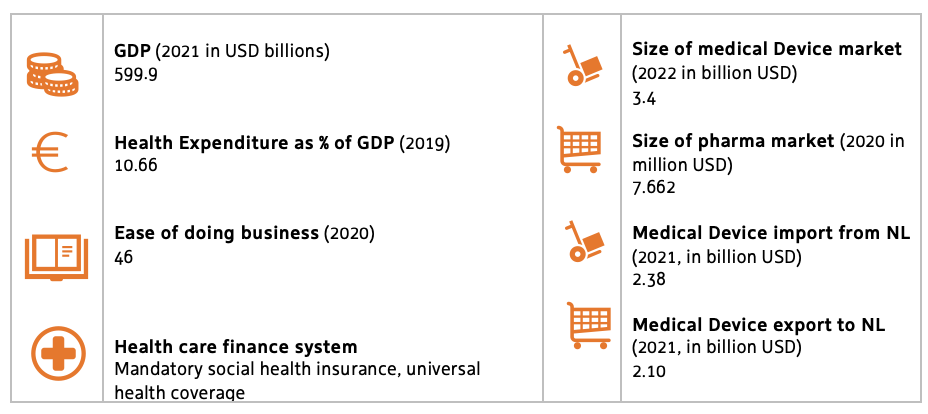The Dutch interest in Belgium is still considerable. However, as it is a nearby market, most Dutch companies travel themselves to Belgium instead of participating in collective activities. The majority of Dutch organisations active in Belgium can be found in the category of small and medium sized businesses.
Most prominent NL value chains
1. The Digital Transformation of Health and Care: the use of data for clinical decision-making, diagnosis of disease, detection of acute and long-term risks, treatment plans and monitoring.
· Dutch research is focused around health data management and detection & screening tools, which can facilitate data analysis. Dutch solutions have a strong focus on improving efficiency and clinical decision support tools.
· Since more and more health-related data is being measured and collected in Belgium, the potential for analysing this data is increasing. Dutch organisations can support the transition of Belgian healthcare towards digitalisation. The Netherlands has considerable experience in digital healthcare, which it is ready to share with similar countries like Belgium.
2. Healthy Living & Ageing: Research and solutions that contribute to maintaining (prevention), strengthening and recovering (rehabilitation) physical and mental wellbeing, by increasing people’s independency.
· Life expectancy in the Netherlands is one of the highest in the world and the Dutch therefore have considerable experience regarding healthy living and ageing. They know that a holistic approach and multidisciplinary collaboration are key pillars in achieving healthy living. They also acknowledge the important role of prevention and healthy lifestyles.
· The Belgium elderly population demands both an expansion of existing (geriatric) healthcare services and adapting current health delivery models. In addition, there is a need in Belgium to accelerate the plans regarding prevention. By means of primary care and care coordination (integrated care), Belgium strives to keep patients out of expensive hospitals. By making care more integrated and focused on home care, healthcare will become more efficient and patient-centered.
3. Connected Care: Connecting data, systems, information and persons in a convenient, safe and secure way.
· Dutch expertise in Connected Care facilitates anytime and anywhere access to healthcare. This makes healthcare available to everyone regardless of their socioeconomic background. Dutch eHealth solutions are renowned for their simplicity, consistency and flexibility. They are being developed through extensive collaboration and co-creation, involving government, research institutes, SMEs, multinationals and civil society. The small Dutch home market forces them to adapt solutions to international standards, cultures and ways of working.
· Sharing and digitalising information is crucial for facilitating the eHealth plan 2019- 2021 from the Belgian government. With the rise of home care, there is an increasing need for enabling technologies in this field. These enabling technologies are necessary to assist the value chain of Healthy Living & Ageing.
4. Biopharma
· Considering the strengths of the Flanders and the Netherlands biotech ecosystems and joint ambitions in the field of personalised medicine, Biopharmaceutical Developments and Personalised Medicine is the fourth value chain on which sustainable bilateral cooperation is foreseen.
Overview milestones & flagships
· G2G (MoU, state visits, thematic focus on prevention and digitalisation, for example)
· Trade (PIBs, Market study, missions, incoming delegations)
· Innovate (joint R&D projects, specific bilateral calls)
· Invest (significant investments in the Dutch LSH sector)
· RegMedXB is a longer running, cross-border, strategic collaborative effort between Dutch clusters and the Leuven region
Collective Activities to Belgium
2018
· Economic mission to Belgium (Leuven). Led by Sigrid Kaag, Minister for Foreign Trade and Development Cooperation. Focus on digital health.
· Signing of MoU Netherlands & Flanders on Personalised Medicine
2019
· Healthcare mission to Belgium
· Thematic focus on eHealth with emphasis on elderly care.
· Incoming Belgian mission to the Netherlands as part of the Health~Holland Visitors Programme (HVP) and World of Healthcare.
2020
· Incoming Belgian mission to the Netherlands as part of the Health~Holland Visitors Programme (HVP) and World of Healthcare.
2021
· Life-on-Chip Conference 2021
· Knowledge seminar
· Health~Holland meet-up Belgium, to update LSH organisations on the latest developments in the Belgian healthcare market.
· The bilateral R&D call “Cell-Based Technolgies” between EWI/Vlaio and EZK/H~H/RVO is launched
The way forward
Several initiatives will be deployed from 2023 onwards to strengthen relations that have been built up in recent years:
Knowledge sharing
Dutch and Belgian LSH organisations have considerable experience, which can benefit the internationalisation of other organisations. Efforts to facilitating knowledge sharing among stakeholders will therefore be stimulated.
Bilateral R&D cooperation
Within existing frameworks for bilateral research and innovation cooperation, like EUREKA, Eurostars and Horizon Europe many Belgian-Dutch collaborations have been supported over the years. These programs and associated matchmaking and networking events can be used to strengthen the bilateral ambitions. Continuing the collaborations between RVO and VLAIO.
Building sustainable relationships with Belgian counterparts
Building long-lasting relationships is an integral part of the Health~Holland International Strategy 2020-2023. Relationships built up in recent years will be strengthened. Intended broader collaborations are foreseen with In4Care, Agoria and Voka Health Community as well specific collaborations with EWI, VLAIO and FWO in line with the MoU.
Preferred actions
· Collective participation (mission or NL pavilion) at Health & Care 2023.
· Matchmaking and further deepening of collaboration on personalised health concerning the MoU with Flanders.
· Collaboration between Voka, Agoria, In4Care and TFHC to further connect the healthcare ecosystems.

